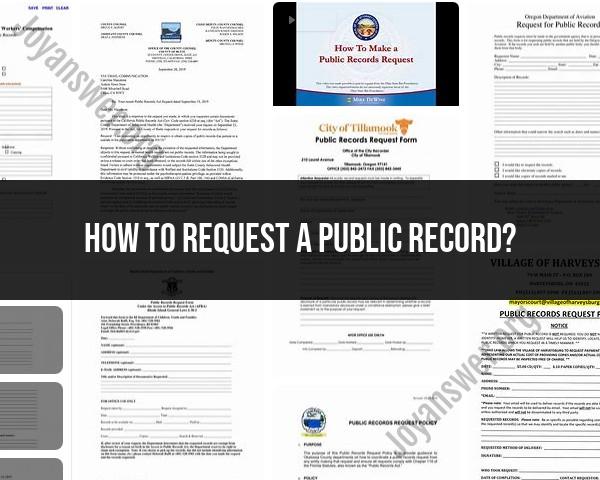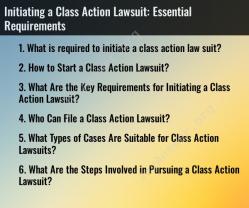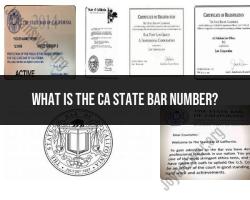How to request a public record?
Requesting a public record can vary depending on your location and the specific public agency or organization you're seeking records from. However, here is a general step-by-step guide to help you request a public record:
Identify the Record You Need:Start by identifying the specific public record you need. Be as precise as possible in describing the record to ensure you receive the information you're looking for.
Determine the Appropriate Custodian:Find out which government agency or organization is the custodian of the public record you're seeking. Public records are typically held by government agencies, such as city or county offices, state agencies, or federal agencies.
Check the Open Records Law or Sunshine Law:Research the open records law or sunshine law in your jurisdiction. These laws outline the procedures and requirements for requesting public records, as well as any exemptions or restrictions.
Review the Agency's Policies:Visit the website of the government agency or organization that holds the record. Look for information on their policies and procedures for requesting public records. They may have specific forms, guidelines, and contact information listed.
Prepare Your Request:Create a formal written request for the public record. Your request should include the following information:
- Your name, contact information, and mailing address.
- A clear and specific description of the record you're requesting.
- The preferred format for receiving the record (e.g., digital copy, paper, etc.).
- Any specific legal basis for your request, if applicable.
Submit Your Request:Send your request to the designated custodian of the public record. This can usually be done by mail, email, fax, or through an online portal, depending on the agency's preferred method. Be sure to follow the agency's specific submission instructions.
Pay Any Required Fees:Some agencies may charge fees for copying, printing, or processing public records. Be aware of any potential costs associated with your request and be prepared to pay these fees, if applicable.
Wait for a Response:After submitting your request, you should receive a response from the agency. They may acknowledge your request and provide an estimated timeline for fulfilling it. If your request is denied, the agency should specify the legal basis for the denial.
Review the Record:If your request is approved, you will receive the requested public record. Review the document carefully to ensure it contains the information you need.
Respect Privacy and Restrictions:Be aware of any privacy concerns or restrictions on the use of the public record. Use the information responsibly and in accordance with applicable laws.
Remember that public record request procedures can vary by location and government agency, so it's essential to check with the specific agency or organization for any unique requirements or procedures they may have in place.
Requesting a Public Record: Guidelines and Procedures
Public records are documents and data created or maintained by government agencies. They are generally accessible to the public upon request.
To request a public record, you should follow these steps:
- Identify the public record you want. Be as specific as possible.
- Find the appropriate government agency. You can usually find this information on the agency's website or by calling the agency's main phone number.
- Submit your request. You can usually submit a public records request in writing, by email, or in person.
- Be prepared to pay a fee. Some government agencies charge a fee for processing public records requests.
The Freedom of Information Act (FOIA) and Public Records
The Freedom of Information Act (FOIA) is a federal law that gives the public the right to access government records. FOIA applies to all federal government agencies, including the executive, legislative, and judicial branches.
FOIA requests are typically made to the agency that created or maintains the record. The agency must respond to the request within 20 business days. If the agency cannot respond within 20 business days, it must extend the deadline and explain the reason for the extension.
Public Records Requests: Who to Contact and How
To find out who to contact for a public records request, you can usually visit the government agency's website or call the agency's main phone number. Some agencies also have a dedicated public records office.
To submit a public records request, you can usually do so in writing, by email, or in person. Be sure to include your name, contact information, and a description of the public record you are requesting.
Navigating Privacy and Access Issues in Public Records
There are some privacy and access issues to be aware of when requesting public records. For example, some government agencies may withhold certain types of information, such as personal information or trade secrets.
If you have any concerns about privacy or access, you should contact the government agency directly. They should be able to explain their policies and procedures.
The Role of Public Records in Transparency and Accountability
Public records play an important role in transparency and accountability. By giving the public access to government records, public records help to ensure that the government is operating in a fair and open manner.
Public records can also be used to investigate government corruption and to hold government officials accountable. For example, journalists often use public records to write stories about government spending, procurement, and other activities.
Conclusion
Public records are a valuable resource for the public. By understanding your rights and following the proper procedures, you can request and obtain public records.












